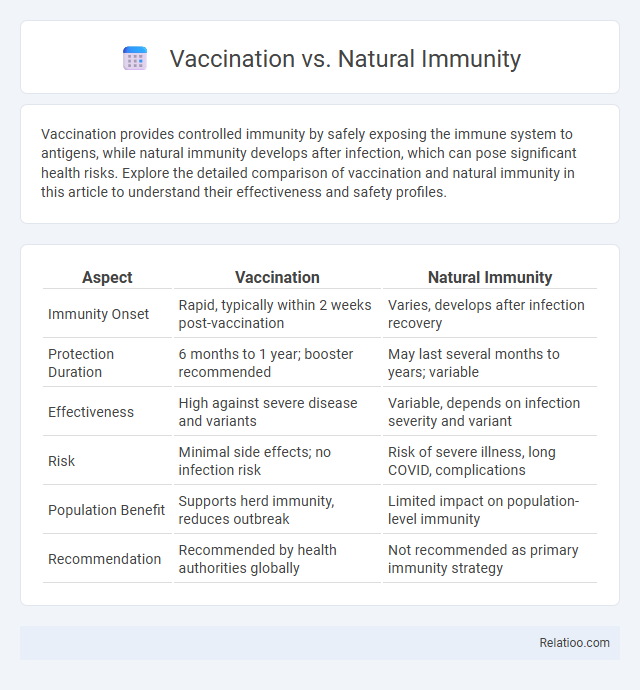Vaccination provides controlled immunity by safely exposing the immune system to antigens, while natural immunity develops after infection, which can pose significant health risks. Explore the detailed comparison of vaccination and natural immunity in this article to understand their effectiveness and safety profiles.
Table of Comparison
| Aspect | Vaccination | Natural Immunity |
|---|---|---|
| Immunity Onset | Rapid, typically within 2 weeks post-vaccination | Varies, develops after infection recovery |
| Protection Duration | 6 months to 1 year; booster recommended | May last several months to years; variable |
| Effectiveness | High against severe disease and variants | Variable, depends on infection severity and variant |
| Risk | Minimal side effects; no infection risk | Risk of severe illness, long COVID, complications |
| Population Benefit | Supports herd immunity, reduces outbreak | Limited impact on population-level immunity |
| Recommendation | Recommended by health authorities globally | Not recommended as primary immunity strategy |
Understanding Vaccination and Natural Immunity
Vaccination stimulates Your immune system by introducing a safe form of a pathogen, enabling rapid and targeted defense without the risks of severe illness, while natural immunity develops only after actual infection, which can result in unpredictable health complications. Understanding vaccination's controlled exposure contrasts with natural immunity's reliance on direct pathogen encounter, highlighting the preventive advantages in managing health crises. Optimizing community immunity through vaccines reduces disease spread, hospitalizations, and mortality rates, proving essential during widespread health emergencies.
How Vaccines Train the Immune System
Vaccines train the immune system by introducing a harmless component or a weakened form of a pathogen, prompting the body to produce specific antibodies and memory cells without causing illness. This controlled exposure enables the immune system to recognize and combat the actual pathogen more effectively during future encounters, reducing the severity and spread of infectious diseases. Unlike natural immunity, which relies on infection and recovery, vaccination provides a safer and more predictable method to build immunity and prevent health crises.
Natural Immunity: Infection-Based Protection
Natural immunity is the immune system's response developed after exposure to a specific infection, providing infection-based protection by recognizing and attacking the pathogen during future encounters. While vaccination offers targeted immunity by introducing antigens in a controlled manner, natural immunity can sometimes lead to broader immune memory due to exposure to the entire pathogen. Your health during a crisis benefits most when combining natural immunity insights with vaccination strategies to ensure robust and comprehensive protection against emerging infectious diseases.
Strength and Duration of Immunity
Vaccination provides a controlled and predictable immune response, often offering stronger and longer-lasting protection compared to natural immunity from infection, which can vary widely in strength and duration. Your immune system, when boosted by vaccines, develops memory cells that more reliably guard against severe illness during a health crisis. This consistency in immunity strength helps reduce hospitalizations and mortality rates, making vaccination a critical tool in managing public health emergencies.
Safety Profiles: Vaccination vs Natural Infection
Vaccination offers a controlled exposure to antigens, significantly reducing the risk of severe illness, hospitalization, and complications compared to natural infection. Natural immunity can provide robust protection but comes with unpredictable severity and potential for long-term health consequences, including post-viral syndromes. Public health data consistently show vaccines maintain superior safety profiles, minimizing adverse outcomes during health crises like pandemics.
Impact on Community and Herd Immunity
Vaccination plays a critical role in achieving herd immunity by rapidly increasing community immunity levels, which helps protect vulnerable populations and reduce the spread of infectious diseases. Natural immunity, while providing personal protection after infection, varies widely in strength and duration and does not consistently contribute to community-wide protection. Your decision to vaccinate not only safeguards your health but also supports the collective effort to prevent widespread health crises and maintain public health stability.
Reinfection Risks: Comparing Both Paths
Reinfection risks differ significantly between vaccination and natural immunity, with vaccines offering more consistent protection against severe illness and emerging variants. Natural immunity may provide broad defense but varies widely in strength and duration, increasing the likelihood of reinfection in some individuals. You should consider vaccination as a reliable strategy to reduce reinfection rates and help mitigate ongoing health crises.
Variants and Immune Response Differences
Vaccination provides targeted immunity by training the immune system to recognize specific virus variants, often leading to a stronger and more consistent immune response compared to natural infection, which can vary based on the strain and individual health factors. Natural immunity results from exposure to actual virus variants, sometimes offering broader protection but with less predictability and increased risk during a health crisis due to uncontrolled infection severity. The emergence of new variants challenges both vaccine efficacy and natural immunity, necessitating ongoing monitoring and updated vaccination strategies to manage immune response differences and control public health impacts effectively.
Myths and Facts About Vaccination and Natural Immunity
Vaccination provides controlled exposure to pathogens, triggering targeted immune responses without the health risks associated with natural infection, debunking the myth that natural immunity is always superior. Studies show vaccines significantly reduce severe illness and hospitalizations, while natural infection can lead to unpredictable complications and long-term health issues. Health crises worsen when vaccine misinformation fuels hesitancy, undermining herd immunity and prolonging outbreaks despite scientific evidence supporting vaccine safety and efficacy.
Public Health Recommendations and Final Considerations
Public health recommendations emphasize vaccination as a reliable method for developing immunity, reducing disease transmission, and preventing health crises by achieving herd immunity. Natural immunity varies widely among individuals and may not provide consistent protection, especially against emerging variants, making vaccination the preferred strategy. Final considerations highlight the importance of vaccination campaigns, ongoing surveillance, and public education to strengthen community health resilience and mitigate the impact of infectious diseases.

Infographic: Vaccination vs Natural immunity
 relatioo.com
relatioo.com